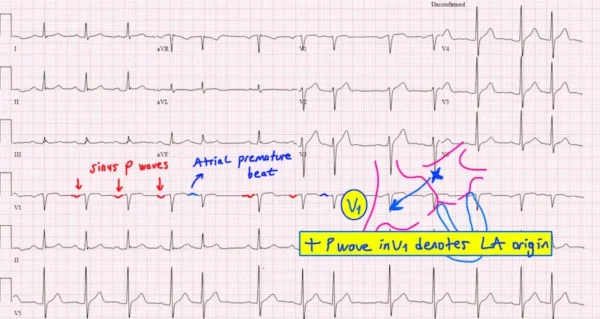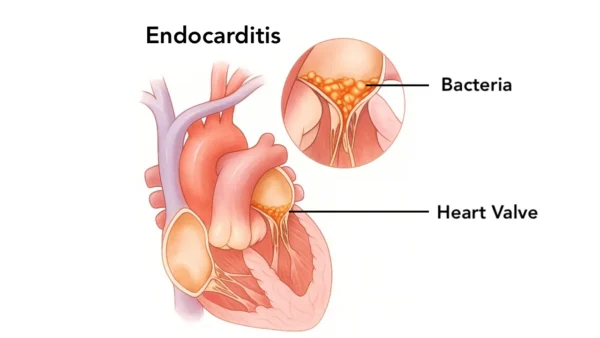Heart block is a condition where there is a delay or complete interruption in the transmission of electrical signals between the upper and lower chambers of your heart. Medically known as atrioventricular (AV) block, this indicates a problem in the electrical pathway that ensures your heart contracts regularly. While mild degrees often show no symptoms, more severe heart blocks can lead to serious symptoms such as fatigue, dizziness, fainting, or shortness of breath. Heart block is diagnosed by an electrocardiogram (ECG) that meticulously examines your heart’s electrical activity, and treatment varies according to the severity, sometimes requiring a permanent pacemaker.
- What is Heart Block?
- What are the Types of Heart Block?
- What Causes Heart Block?
- What are the Symptoms of Heart Block?
- Who is Affected by Heart Block?
- How is Heart Block Diagnosed?
- How is Heart Block Treated?
- What is a Permanent Pacemaker and How Does It Work?
- What are the Risks and Complications of Heart Block?
- When Should Those with Heart Block See a Doctor?
What is Heart Block?
Heart block, or medically termed atrioventricular (AV) block, is a condition where the transmission of electrical signals between your heart’s upper chambers (atria) and lower chambers (ventricles) is slowed or completely interrupted. Your heart needs an intricate network of electrical impulses (signals) to contract in a coordinated manner. These signals originate from your heart’s natural pacemaker (the sinus node) and are then relayed through a crucial junction called the AV node to the ventricles. AV block occurs when there’s a malfunction in this transmission, which can cause the ventricles to beat more slowly or irregularly.
I wanted to prepare a video about heart blocks and the symptoms they cause. You can watch it below.
What are the Types of Heart Block?
Heart block is categorized into three main types based on the degree of delay or interruption in your heart’s electrical conduction: first-degree AV block, second-degree AV block, and third-degree AV block (complete heart block). Each type affects how well electrical signals are transmitted from the atria to the ventricles in different ways. While first-degree is generally benign, second and third-degree blocks can be more serious and may require different treatment approaches. These types are determined by your doctor through ECG analysis.
Heart block is classified according to how much the electrical conduction in the AV node or below is affected.
First-Degree Atrioventricular (AV) Block
- This is the mildest type of AV block. Every electrical signal from your heart’s atria reaches the ventricles, but it is transmitted with a longer-than-normal delay at the AV node. It is characterized by a prolonged PR interval on an ECG.
- It usually causes no symptoms, and individuals do not notice this condition. It is often detected incidentally during a routine ECG.
- Generally benign and does not require treatment. However, it can be a sign of an underlying heart condition or may have the potential to progress to more advanced block types, so follow-up is important.
Second-Degree Atrioventricular (AV) Block
In this type of block, some electrical signals from the atria reach the ventricles, but some are not transmitted at all. This causes the ventricles to regularly miss a beat. There are two main subtypes:
- Mobitz Type 1 (Wenckebach): The delay in the AV node progressively lengthens with each beat until one signal is completely blocked. The cycle then restarts. It is generally benign and may be asymptomatic.
- Mobitz Type 2: The block occurs below the AV node (in the His bundle or Purkinje fibers). Here, each blocked beat does not show a preceding PR prolongation; signals are either transmitted or completely blocked. This type is more serious and carries a higher risk of progressing to complete heart block.
Symptoms such as fatigue, dizziness, lightheadedness, shortness of breath, and palpitations may occur. Mobitz Type 2 more frequently leads to symptoms and more serious complications than Mobitz Type 1.
Mobitz Type 2, in particular, is a more serious condition that may require pacemaker implantation.
Third-Degree Atrioventricular (AV) Block (Complete Heart Block)
- This is the most severe type of AV block. No electrical signals from the heart’s atria can reach the ventricles. The atria and ventricles beat completely independently of each other. The ventricles beat very slowly with an inherent escape rhythm.
- It usually presents with severe symptoms: severe fatigue, frequent fainting spells, severe shortness of breath, chest pain, confusion, and low blood pressure. It can be life-threatening.
- This condition requires urgent medical intervention and is usually treated with the implantation of a permanent pacemaker.
This classification helps your doctor diagnose and determine the most appropriate treatment plan for you.
What Causes Heart Block?
Heart block results from damage or dysfunction within your heart’s electrical conduction system, often arising from a heart attack, cardiac surgeries, or certain heart diseases. Natural wear and tear due to advanced age, side effects of some medications, congenital heart defects, or systemic diseases (such as rheumatic fever or sarcoidosis) can also contribute to this condition. These causes can affect the pathways that carry your heart’s electrical signals, disrupting communication between the upper and lower chambers.
What are the Symptoms of Heart Block?
The symptoms of heart block vary depending on the severity of the condition and the degree of slowing in your heart rate. While you typically experience no symptoms with mild blocks (first-degree), more severe blocks (second and third-degree) can prevent your heart from pumping enough blood to your body. This can lead to symptoms such as fatigue, dizziness, fainting spells, shortness of breath, chest pain, and palpitations. If you notice these symptoms, especially if you experience fainting or severe shortness of breath, seeking immediate medical attention is vital.
The symptoms of heart block depend on the degree of interruption in your heart’s electrical conduction and, consequently, how much it affects the amount of blood pumped to the body.
First-Degree AV Block:
- Typically asymptomatic. This condition may only be discovered during a routine ECG. The heart rate is normal, and patients usually do not notice this condition.
- Generally benign and does not require treatment. However, it can be a sign of an underlying heart condition or may progress to more advanced block types, so follow-up is important.
Second-Degree AV Block:
Symptoms depend on the type of block (Mobitz Type 1 or Type 2) and how much the heart rate is affected.
- Weakness and Fatigue: When blood flow to the heart slows down, your body may not receive enough oxygen, leading to persistent feelings of tiredness.
- Dizziness or Lightheadedness: When blood flow to the brain decreases, you may experience mild dizziness or lightheadedness.
- Fainting (Syncope) or Near-Fainting (Presyncope): Especially when heartbeats slow significantly or become irregular, you may experience fainting spells due to momentary oxygen deprivation to the brain. This is one of the most serious symptoms.
- Shortness of Breath: If the heart cannot pump efficiently enough, you may feel breathless due to fluid accumulation in the lungs or the body’s inability to meet its oxygen demands.
- Chest Pain or Discomfort: Rarely, you may experience chest pain due to insufficient blood flow to the heart (ischemia).
- Palpitations: Your heart may occasionally “skip a beat” or feel like it’s “beating fast” as it tries to compensate for irregular beats.
- Mobitz Type 2 is a more serious condition than Mobitz Type 1 and more frequently leads to symptoms and more severe complications, often requiring pacemaker implantation.
Third-Degree AV Block (Complete Heart Block):
This is the most severe type, characterized by the ventricles beating completely independently of the atria. Symptoms are usually severe and require urgent medical intervention.
- Severe Weakness and Fatigue: You experience constant and intense fatigue due to very little blood being pumped to the body.
- Recurrent Fainting Spells (Syncope): You frequently faint due to severe and sudden interruption of blood flow to the brain. This can be more pronounced during physical activity.
- Severe Shortness of Breath: You experience severe shortness of breath because the heart pumps very slowly and ineffectively.
- Chest Pain: Severe chest pain may occur due to oxygen deficiency in the heart muscle.
- Confusion and Disorientation: You may experience mental fogginess due to insufficient oxygen reaching the brain.
- Convulsions (Seizures): Seizures may occur in cases of severely reduced oxygen flow to the brain.
- Low Blood Pressure (Hypotension): Your blood pressure can dangerously drop due to the heart’s inability to pump effectively.
Who is Affected by Heart Block?
Heart block can occur at any age but is more common in older adults and individuals with specific heart conditions. The risk increases particularly in those who have experienced a heart attack, undergone heart surgery, or have conditions like inflammation of the heart muscle (myocarditis). Additionally, infants with congenital heart defects and individuals taking medications that slow the heart rate are also at risk for heart block. Awareness of these risk factors is crucial for early diagnosis and treatment.
How is Heart Block Diagnosed?
Heart block is diagnosed through an electrocardiogram (ECG), which meticulously examines your heart’s electrical activity. After listening to your symptoms and conducting a physical examination, your doctor will typically order a standard ECG. However, if the block is not continuous or appears intermittently, devices like a Holter monitor or an event recorder, which provide long-term heart rhythm monitoring, may be used. Sometimes, blood tests or other cardiac imaging methods may also be required to identify the underlying cause. Accurate diagnosis is essential for establishing the most appropriate treatment plan.
How is Heart Block Treated?
Treatment for heart block varies depending on the type, severity, and underlying cause of the condition. While first-degree AV blocks typically require no treatment, second-degree Mobitz Type 2 and third-degree (complete) AV blocks generally necessitate the implantation of a permanent pacemaker. The primary goals of treatment are to ensure your heart pumps sufficient blood, alleviate your symptoms, and prevent serious complications. Your doctor will conduct a detailed evaluation to determine the most suitable treatment method for your specific condition.
What is a Permanent Pacemaker and How Does It Work?
A pacemaker is a small device containing a battery and a generator. It is implanted under the skin of your chest, near your collarbone, and connected to your heart with thin wires (leads). The pacemaker monitors your heart’s electrical activity and, when the heart rate drops below a certain level or a beat is skipped, it sends electrical signals to stimulate your heart to beat at a regular rhythm. Modern pacemakers are highly advanced and can adapt to your heart’s needs.
The decision for treatment is made after your doctor conducts a detailed evaluation, determining the type and degree of the block, and considering your symptoms and overall health status. Regular follow-ups and controls are crucial for monitoring the effectiveness of the treatment and preventing potential complications.
What are the Risks and Complications of Heart Block?
Heart block, due to disruptions in your heart’s electrical conduction, can carry serious risks and complications. Especially in advanced blocks, your heart may not pump enough blood to your body, which can exacerbate symptoms like fatigue, dizziness, fainting spells, and shortness of breath. The most significant risks include heart failure, heart attack, and sudden cardiac death. Untreated or severe heart blocks can lead to permanent damage to organs due to insufficient oxygen supply. Therefore, when diagnosed with heart block, regular follow-up and adherence to necessary treatment are vitally important.
When Should Those with Heart Block See a Doctor?
If you have been diagnosed with heart block or are experiencing any of the following symptoms suddenly and severely, you should immediately contact your doctor or go to the emergency room. Particularly, fainting or feeling faint, severe dizziness, shortness of breath, chest pain, and an excessively slow heart rate require urgent medical intervention. Since your heart’s regular beating is vital, you should never underestimate these symptoms.
Reference: Atrioventricular Block






